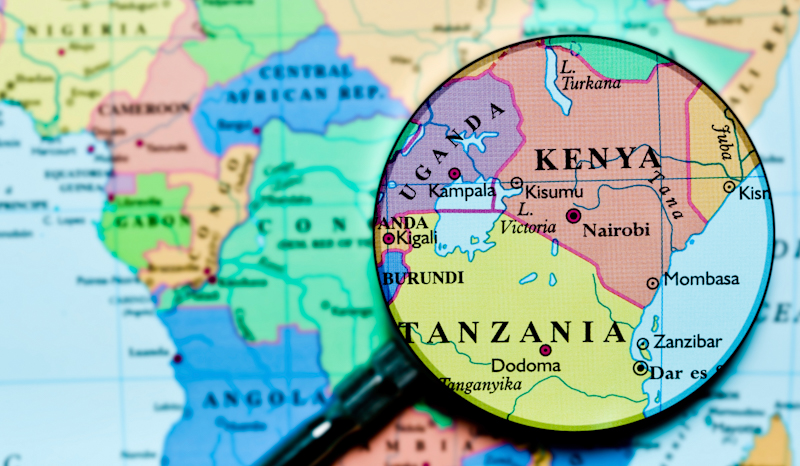 East Africa is positioned to enjoy strong economic performance this year, with growth forecast to surpass 5%.
East Africa is positioned to enjoy strong economic performance this year, with growth forecast to surpass 5%.
These projections from the African Development Bank’s 2023 East Africa Economic Outlook demonstrate remarkable confidence in the market’s buoyancy and resilience despite global economic headwinds and regional challenges.
The upward trend is expected to be spearheaded by countries such as Rwanda, Uganda, Ethiopia, Kenya, Djibouti, and Tanzania, with significant contributions from their services sector. According to the report, this region will be the fastest-growing in Africa, with the most opportunities for innovators to capitalise during rapid digital transformation.
Eastern Africa: a seedbed for growth
This positive outlook is a combination of several factors, among them geography. East Africa, called the ‘Horn of Africa,’ is a critical gateway to international trade near the Middle East, the Red Sea, and Asia.
This geostrategic advantage has recently been amplified by the World Bank’s significant backing of a groundbreaking initiative to create a unified single digital market across the region. The $130 million project, dubbed the Eastern Africa Regional Digital Integration Project – II (EARDIP-SOP-2), is taking an innovation-first approach with the potential for revolutionary yield.
This scheme can effectively end Eastern Africa’s digital deserts, empower entrepreneurialism in communities, and unlock economic opportunities for millions.
This is an opportunity that must not be squandered. With 76% of South Sudan’s population dependent on humanitarian aid, the region desperately requires long-term planning. Alongside meaningful training in financial and business skills, this investment will build market confidence and trigger subsequent foreign direct investment in the area.
The EARDIP-SOP-2 is poised to attract an estimated $30 million in private investment, creating a dynamic ecosystem for digital growth and prospective seed funding for new businesses.
Several important factors make East Africa ideal as a base for digital acceleration. With tech-enabled payments growing rapidly in popularity, mobile phone usage at record levels, and a concerted effort from local governments and international organisations to turbo-boost the pace of change, there is no doubt of the phenomenal economic opportunity in the region.
A tech-first approach
A continued path to growth must put technology centre stage. Broadband access is a key regional challenge; fibre optic infrastructure must be improved, hampering digital progress.
Seamless broadband underpins major global tech hubs and economies. Countries such as Somalia and Djibouti are set to undergo a significant levelling up of broadband connectivity, capacity, and affordability.
In turn, this will foster cross-border data flows and, subsequently, deeper regional integration and national inclusion. Funding must be in tandem with skills training to develop the crucial skilled talent needed for a thriving tech ecosystem. Eastern Africa has a young population—an untapped reservoir of young, prospective talent.
The scheme must be underpinned by inclusivity. Ethiopia has the second-highest population of refugees in Africa and over 80 ethnic groups. Empowering refugees and diverse communities with funding accessibility to digitally enabled payment providers has the potential to bridge social divisions and encourage regional prosperity.
Infrastructure efforts are already making great headway. Kuwait-headquartered network provider Zain Group announced an investment of $800 million in its mobile service provision in Sudan over five years. Equinix has also announced its intention to invest $390 million in building data centres in Africa over the next five years, with the digital infrastructure company noting that it will be exploring opportunities in East Africa. These private sector-led initiatives are an encouraging indicator of the current appetite for investing in the region.
Fintech is also in a prime position to accelerate digitisation. It fosters financial inclusion by removing friction with payments and deconstructing the barriers to personal finance management.
Paymentology supports the backbone of personal finance management as a global physical and virtual card issuer to fintech, telcos, and banks in the region, which are essential to the economic development story.
Djibouti as a regional financial hub
Each nation’s intricacies contribute to East Africa’s economic potential. Take Djibouti—with its extensive undersea cable infrastructure; the nation can support broader regional data centres and increased consumer connectivity.
The Djibouti government boldly aims to serve as a financial and technological hub for the wider region. It is working hard to attract foreign investment into other key sectors to diversify the economy.
As a politically stable state with free capital movement and a currency pegged to the US dollar, the nation is primed to serve the region as a financial hub effectively.
The banking sector has grown in recent years from just two banks to thirteen, with more competitors set to arrive soon, expanding the financial services offered to regional partners.
The Central Bank of Djibouti has strengthened the regulatory environment and made considerable efforts to improve credit allocation to the broader economy.
The growing capabilities within Ethiopia and Djibouti are set to benefit burgeoning nations such as South Sudan, providing the digital financial infrastructure needed to overcome local financial inclusion barriers.
A framework for a vibrant future
Ensuring the Horn of Africa is open to business is a global issue.
The EARDIP-SOP-2 will create opportunities for East African countries whose broken systems have plagued them for too long.
Used constructively, this is a game-changing initiative to get Eastern Africa on the digital grid for a good while establishing the region as a hotbed for investment.
The region’s history means the stakes are high. Still, this potential investment is a welcome catalyst for sustainable growth in a region that most certainly deserves change—now more than ever.
Kirsten Wortmann, Regional Director for Africa, Paymentology




